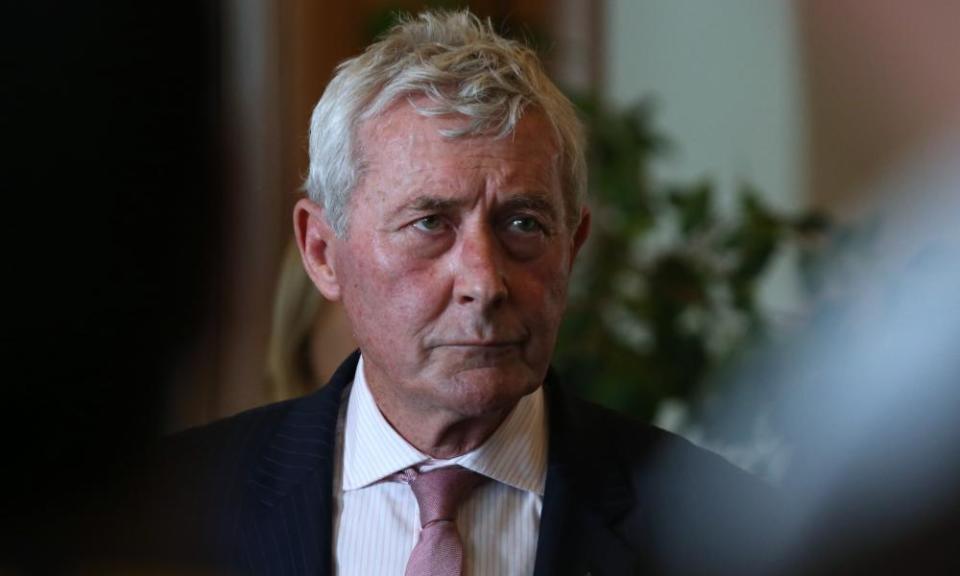Bernard Collaery’s lawyers say government’s secret evidence would cause ‘irreparable prejudice’

Lawyers for Bernard Collaery have complained the government’s attempts to put forward new, hidden evidence to justify secrecy in the case will cause “irreparable” and “obvious” unfairness.
The case against Collaery, which has dragged on now for more than two years, was back before the ACT supreme court on Friday, where the commonwealth again pushed to introduce new evidence about the potential national security risks of hearing parts of the proceedings in public.
Collaery, a barrister, is facing trial for his alleged role in revealing a 2004 bugging operation Australia mounted against Timor-Leste. Timor-Leste claims the operation was designed to give it an advantage during negotiations with the impoverished and fledgling nation over oil and gas reserves in the Timor Sea.
The ACT court of appeal earlier this year ruled against the federal attorney general’s attempts to keep significant parts of the trial hidden from the public on national security grounds, saying that open justice was needed to deter political prosecutions.
The commonwealth is now attempting to put forward new “updated” evidence about the state of national security and international relations, which may affect the court’s consideration of whether to hear parts of the case openly.
That evidence would be hidden from Collaery and his lawyers. Only the judge would be permitted to see it.
“The unfairness is obvious and it is irreparable,” Collaery’s barrister, Christopher Ward SC, told the court. “It is an irreparable prejudice. The unfairness is that the commonwealth gets to update evidence ... as to world events, as to the current state of asserted threats to national security in the way that the defendant is simply unable to respond to.”
The court heard that much has changed for Australia’s international relations in the 18 months since the case began, including, for example, the dispute with France over the submarines contract, the resignation of Christian Porter as attorney general, and the Brereton inquiry report into alleged special forces war crimes in Afghanistan.
Ward warned of an “endless process” in which delays to the case allowed the commonwealth a continuous ability to say the world had changed, and that new factors ought to be taken into account when determining the national security risk of the trial.
But Jeremy Kirk SC, representing the attorney general Michaelia Cash, said the commonwealth was simply trying to update the evidence, now two years old, on the potential national security ramifications, not reopen the original hearing on how much of the trial should be conducted in secret.
Kirk said it would be absurd to not allow such evidence to be updated and dismissed the suggestion it would lead to an endless process of delay and updating evidence.
The unfairness, he said, would be towards the attorney general and the national security interests of Australia, should the commonwealth not be permitted to update the evidence.
“That is a bit of an unreal submission, in our respectful submission ... this evidence is 18 months to two yers old,” he said.
Justice David Mossop has reserved his decision on whether to accept the new evidence. He will hand down his judgment on Tuesday.
Related: Bernard Collaery hails ‘victory for justice’ as court overturns bid to keep evidence hidden at trial
The Human Rights Law Centre criticised any move to hold the trial away from the public eye.
“This trial should not be going ahead – there is no public interest in prosecuting whistleblowers,” senior lawyer Kieran Pender said.
“And it certainly shouldn’t be going ahead behind closed doors, with secret evidence that not even Bernard Collaery can see.
“Using secret evidence in the secret prosecution of a whistleblower who exposed government wrongdoing is dangerous and undemocratic.”
Collaery was acting for his client, former intelligence officer Witness K, when the pair helped Timor-Leste mount a case in the international courts against Australia, alleging a treaty governing resources in the Timor Sea was void because of Australia’s bugging operation.
Timor-Leste subsequently negotiated a better deal for a fairer share of the oil and gas reserves.

 Yahoo Finance
Yahoo Finance 